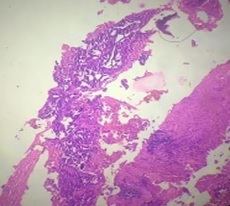Papillary carcinoma of the male breast in a comparatively young patient: A case report of a rare entity
Abstract
Breast carcinoma in men is rare and intra-cystic papillary carcinoma of male breast is an extremely rare entity. Papillary lesions of male breast comprise of the spectrum of lesions ranging from benign intraductal papilloma to intraductal papillary carcinoma and invasive papillary carcinoma. It occurs most commonly in the seventh decade of life and accounts for <1% of all breast malignancies. The present case report is of a comparatively younger, 37 years old male who presented with a mass on lower quadrant (retro-areolar region) of the left breast.
Downloads
References
(1). Siegel R, Ward E, Brawley O, Jemal A. Cancer statistics, 2011: the impact of eliminating socioeconomic and racial disparities on premature cancer deaths. CA Cancer J Clin. 2011;61(4):212-236. doi: 10.3322/caac.20121.
(2). White J, Kearins O, Dodwell D, Horgan K, Hanby AM, Speirs V. Male breast carcinoma: increased awareness needed. Breast Cancer Res. 2011;13(5):219. doi: 10.1186/bcr2930.
(3). Sasco AJ, Lowenfels AB, Pasker-de Jong P. Review article: epidemiology of male breast cancer. A meta-analysis of published case-control studies and discussion of selected aetiological factors. Int J Cancer. 1993;53(4):538-549. doi: 10.1002/ijc.2910530403.
(4). Shah P, Robbani I, Shah O. Clinicopathological study of male breast carcinoma: 24 years of experience. Ann Saudi Med. 2009;29(4):288-293. doi: 10.4103/0256-4947.55314.
(5). Kwiatkowska E, Teresiak M, Filas V, Karczewska A, Breborowicz D, Mackiewicz A. BRCA2 mutations and androgen receptor expression as independent predictors of outcome of male breast cancer patients. Clin Cancer Res. 2003; 9(12):4452-4459.
(6). Ruddy KJ, Winer EP. Male breast cancer: risk factors, biology, diagnosis, treatment, and survivorship. Ann Oncol. 2013;24(6):1434-1443. doi: 10.1093/annonc/mdt025.
(7). Kraus FT, Neubecker RD. The differential diagnosis of papillary tumors of the breast. Cancer.1962;15:444-455. doi: 10.1002/1097-0142(196205/06)15:3<444::aid-cncr2820150303>3.0.co;2-0.
(8) Fisher ER, Palekar AS, Redmond C, Barton B, Fisher B. Pathologic findings from the National Surgical Adjuvant Breast Project (protocol no. 4).VI. Invasive papillary cancer. Am J Clin Pathol. 1980;73(3):313-322. doi: 10.1093/ajcp/73.3.313.
(9) Romics L, O’Brien ME, Relihan N, O’Connell F, Redmond HP. Intracystic papillary carcinoma in a male as a rare presentation of breast cancer: a case report and literature review. J Med Case Rep. 2009;3(13):1-4. doi: 10.1186/1752-1947-3-13.
(10) Solorzano CC, Middleton LP, Hunt KK, Mirza N, Meric F, Kuerer HM, et al. Treatment and outcome of patients with intracystic papillary carcinoma of the breast. Am J Surg. 2002; 184(4):364-8. doi: 10.1016/s0002-9610(02)00941-8.
(11) Tsuda H, Uei Y, Fukutomi T, Hirohashi S. Different incidence of loss of heterozygosity on chromosome 16q between intraductal papilloma and intracystic papillary carcinoma of the breast. Jpn J Cancer Res. 1994;85(10):992-996. doi: 10.1111/j.1349-7006.1994.tb02895.x.
(12) Lee SK, Choi JH, Lim HI, Kim WW, Kim S, Cho EY, et al. Experience with Intracystic Papillary Carcinoma of the Breast at a Single Institute in Korea. J Breast Cancer. 2009;12(4):338-343. doi: 10.4048/jbc.2009.12.4.338.
(13) Pant I, Joshi SC. Invasive papillary carcinoma of the male breast: Report of a rare case and review of the literature. J Can Res Ther.2009;5(3):216-218. doi: 10.4103/0973-1482.57132.
(14) Lefkowitz M, Usar CM, Lefkowitz W, Wargotz ES. Intraductal (intracystic) papillary carcinoma of the breast and its variants: A clinicopathological study of 77 cases. Hum Pathol.1994;25(8):802-609. doi: 10.1016/0046-8177(94)90250-x.
(15). Hill CB, Yeh IT. Myoepithelial cell staining patterns of papillary breast lesions: from intraductal papillomas to invasive papillary carcinomas. Am J Clin Pathol. 2005;123(1):36-44. doi: 10.1309/xg7tpq16dmjav8p1.
(16). Collins LC, Carlo VP, Hwang H, Barry TS, Gown AM, Schnitt SJ. Intracystic papillary carcinomas of the breast: a reevaluation using a panel of myoepithelial cell markers. Am J Surg Pathol. 2006;30(8):1002-1007. doi: 10.1097/00000478-200608000-00011.
(17) Dixon JM, Page DL, Anderson TJ, Lee D, Elton RA, Stewart HJ. Long term survivors of breast cancer. Br J Surg.1985;72(6):445-448. doi: 10.1002/bjs.1800720614.

Copyright (c) 2020 Author (s). Published by Siddharth Health Research and Social Welfare Society

This work is licensed under a Creative Commons Attribution 4.0 International License.


 OAI - Open Archives Initiative
OAI - Open Archives Initiative


